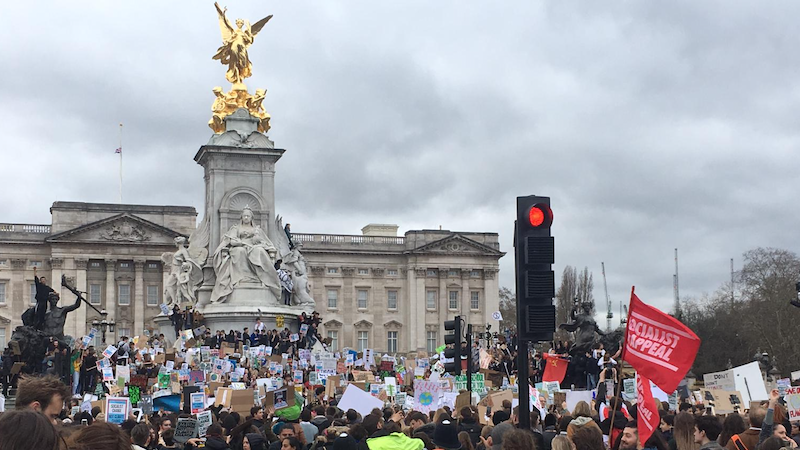In more than 100 countries on Friday, young people spilled out of schools and into the streets to demand their governments protect their future.
Tens of thousands of students, young people and supportive chaperones joined protests large and small across the world. At the time of publication, 2083 protests had been registered across 125 countries with the platform Fridays for Future.
In London, a crowd estimated at ten thousand marched on an impromptu route between Parliament Square, Buckingham Palace and Downing Street.
Punching their fists into the air, they belted out slogans “What do we want? Climate justice now” and held a flurry of placards. Climate Home News spoke to marchers who expressed anxiety and fear about their future.
“I’ve always known it’s been a problem and it’s become a bigger problem recently,” William, aged 11, said. “It’s very worrying because we need this planet to survive, because we don’t have another planet. I’m very worried the planet will change. If it changes, it will become uninhabitable and everyone will die.”
“We haven’t known a world where climate change isn’t an issue,” Maxime, 18, said. “We’ve just watched people ignore it. Slowly learning about it, you think this is absurd.”
Indra added: “It’s not an abstract idea any more. It’s like it’s happening this year with massive weather storms.”
Strikers said they were angry that their interests were not being protected by politicians. Otto Omelli, from North London, told CHN that he was striking to call on the government to lower the voting age to 16.
The UK Student Climate Network has urged British politicians to give young people a greater voice in the climate conversation. In a letter circulated on Twitter on Thursday, the group called on a group of British leaders that included Labour’s Jeremy Corbyn, prime minister Theresa May and Scottish first minister Nicola Sturgeon, to meet with them.
Dotted with signs calling on May to step down, the march also offered the opportunity for many to express their dissatisfaction with the current Conservative government.
According to media reports, chancellor Phillip Hammond recently used the budget update to appease the climate school strike movement with a series of green measures, including a ban on gas heating in new-build houses from 2025 and consultations with airlines to allow passengers to offset their emissions.
But Molly, 17, from Hampstead, wasn’t impressed. “Gas by 2025, sorry but that’s too late.”
“Renewable energy is ready to go as long as the government puts money in it, that’s all we need,” Maxime, said.
Many also voiced frustration over the attention granted to Brexit in comparison to climate change, with Otto describing it as “a distraction”.
Both Indra and Maxime echoed Greta Thunberg, the 16-year-old Swdish activist who inspired the movement, to call for the strikes to last as long as was necessary.
“You’ve got to start somewhere,” Indra said. “This is us actually doing something, not just learning something theoretical at school and telling parents: oh yeah, you should tell your parents to turn the lights off. Like this us and slightly getting in the way. They’ve got to be inconvenient to make them to do something, because [the adults] are selfish and self-absorbed. If we’re literally blocking their way to work, they might be like: hang on.” (Later, some observers reported that the strikers had blocked traffic around central London.)
“I think the protests will last,” Molly said. “I’m not sure they’re going to be 100% successful, which is upsetting. But we have so much anger, there’s no way we’re going to stop.”
An estimated 20,000 students gathered in Berlin’s Invalidenpark, before marching toward the Chancellery. They included elementary school students with their parents, high school students who attended with their schools’ blessing, and college students who said they were awed by the activism of kids just a few years younger than them. Students held signs and chanted “Wir sind hier, wir sind laut, weil ihr uns unsere Zunkunft klaut” (“We are here, we are loud, because you are stealing our future”).
Helene Hager and Nick Bley, both 18, attended with about 60 kids from their school, Grüner Campus Malchow in Lichtenberg, Berlin. Their school supported students who wanted to attend the protest, excusing their absence.
Why did they attend? “It’s our future, and I think it’s very important to fight for that,” said Bley, who carried a “Make Our Planet Great Again” sign.
“It’s very annoying that the media and the politics don’t really do anything to improve our environment, [they] make other topics more important,” said Hager, who was attending her first protest.
“We are all young people, and in Germany they say, oh the young people are not interested in politics” said Bley. “Fridays for Future brings so many young people to the streets of Berlin…it’s very nice to be here and see the unity.
Rachel Waldholz was reporting in Berlin for Clean Energy Wire
